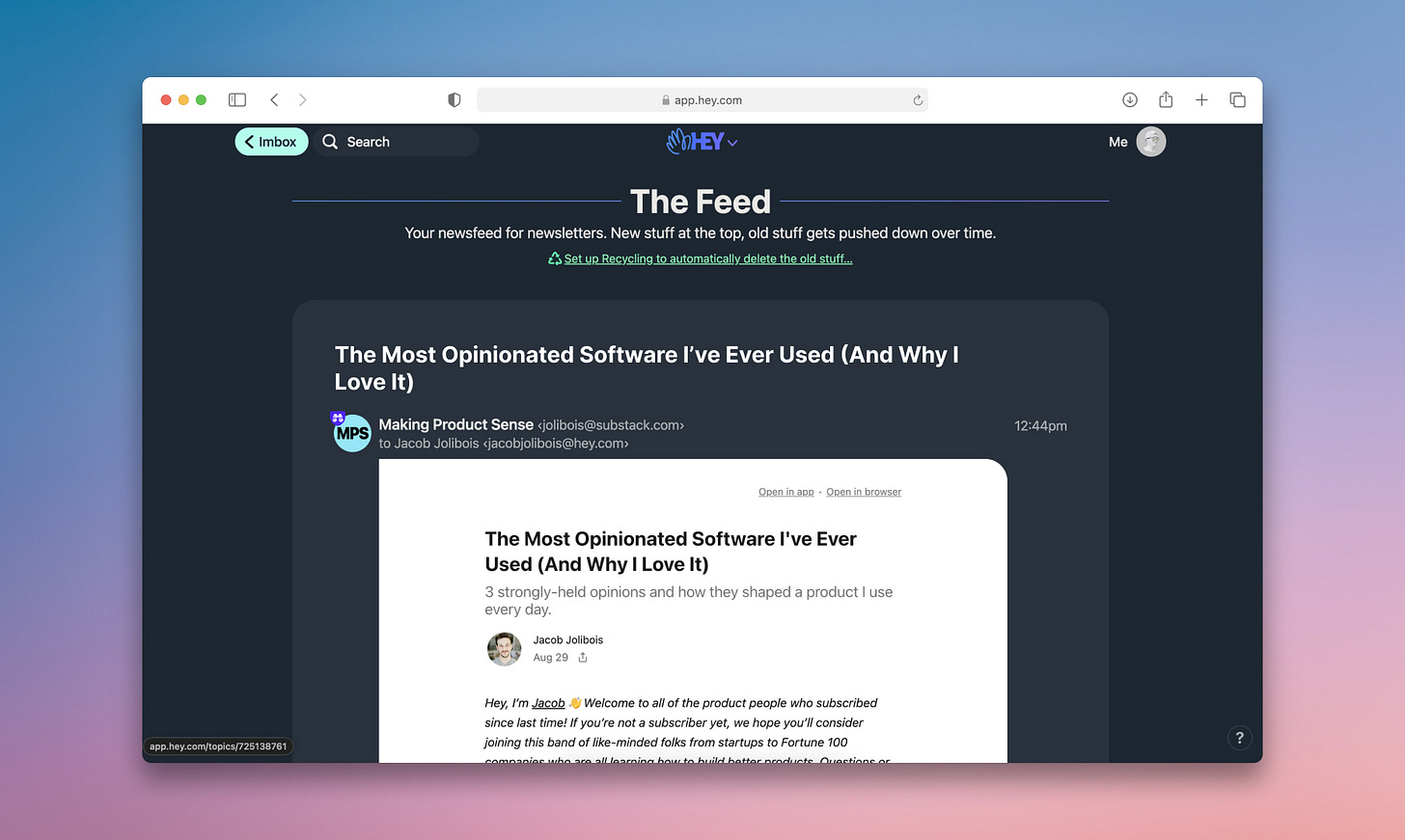"Hey" Is The Most Opinionated Software I've Ever Used (And Why I Love It)
And my opinion on "opinionated software"
Hey, I’m Jacob 👋 Welcome to all of the product people who subscribed since last time! If you’re not a subscriber yet, we hope you’ll consider joining this band of like-minded folks from startups to Fortune 100 companies who are all learning how to build better products. Questions or feedback? Drop ‘em here.
Email is broken. Everyone says so.
Superhuman says it's too clunky.
Protonmail says it's too public.
Tempo says it's too distracting.
I think they're all right in their own ways and each have built beautiful solutions to the problems they see in email.
But have you thought about just how crazy that is?
These deep-seeded convictions have driven entire companies to be built around tools for a utility that is both ubiquitous and overwhelmingly free. But people are paying for these new tools every single month because they also carry these convictions!
This is a glimpse into the growing product philosophy of "opinionated software".
Opinionated software is the decision to purposefully build a product around a specific approach, process or experience based on a deep conviction that it is the best way.
If a user can't get on board with your "best way", they can kick rocks. Or go use a competitor's (worse) product. Either one really.
I believe this movement is a course correction to what I call "market feature parity" in which companies within a given space all trend toward having the same features in an attempt to steal market share from their competitors.
In the same way that the universe defaults to chaos (entropy), product development defaults to feature bloat.
Not because companies want a bloated product but because, as a company pursues growth, they naturally must expand their market share.
More users = more needs.
More needs = more use cases.
More use cases = more features.
It makes perfect sense. But there has to be checks and balances. There has to be a way for a product to mature without turning into an overly-complex behemoth.
To me, that’s where "opinionated software" comes in. It’s the antithesis of market feature parity. And that's what I want to explore today. The deeply held convictions that products are built upon.
We're going to explore it through the lens of the most opinionated piece of software I've ever used: Hey.
Hey is another one of those email companies like Superhuman that believes email must be reinvented, though I would argue their convictions are much deeper and much more intense. I've been using it for a couple of years now and it turns out I'm one of those crazy people who is willing to pay for a traditionally free utility because of those shared convictions.
To illustrate, I want to go through three convictions of this ridiculously opinionated product and walk you through the features and workflows that were born out of it.
Opinion #1: Email should be private.
The physical mail that you receive isn’t read by the Postal Service nor can the senders find out if you’ve opened it. It’s private. Your email should be as well.
Opinionated Product: Dedicated email service, not just an email client.
Hey has a strong conviction that email trackers - spy pixels - should be a federal crime. Why should someone else be able to see how you've interacted with your email?
This is the fundamental belief that led them to build their own email service rather than building an email client like Superhuman on top of Gmail or Outlook.
Now, when an email is sent, all trackers get scrubbed from the message and attached images hit Hey's servers first so if any data does get back to the sender, it shows Hey's IP address instead of yours.
What a beautifully extreme example of "opinionated software!"
Opinion #2: Your inbox is sacred.
Your inbox is like your home. People shouldn’t have access to it unless you want them to.
Opinionated Product: The "Screener"
Hey built your inbox to only receive messages that are important to you. So much so that they call it your "imbox" instead of your "inbox". Im... like IMportant.
And the way they pulled this off is by creating a tool they call the "Screener". All incoming mail from a new email address must pass through your screener where you then decide if you want to allow email from that sender or block it. If you block it, you will never receive another email from that sender again.
It sounds a lot like blocking emails in any other email service except that it's been elevated to a first-class citizen. Every single sender must be approved by you to have access to your imbox.
Opinion #3: Not all emails are created equal.
Different types of people come into your home. Your family, your friends, the repair man… and they all get different access privileges. So should email senders.
Opinionated Product: Imbox, Feed and Paper Trail
When you are screening your email, if you choose to screen a sender in, you can select where you want their email to go.
Of course, you can send their emails directly to your imbox. But not everything deserves that level of importance, like a newsletter or a receipt.
If the email is content-related like a newsletter, there's a different inbox that they call your "Feed". This is great for quickly scanning content that you want to consume like a reader app on your phone instead of having to sort through all of the non-content emails in your inbox.
And finally, there's the receipts, verification codes and confirmation emails that are good to keep on the off-chance that you need it, but aren't worth cluttering up your inbox with. Those get sent to the "Paper Trail" for safe-keeping.
There are so many other nuances to the way Hey handles email that I won't get into here. After all, this isn't a review of Hey as much as it is an essay on Opinionated Software. But if you're curious, I'd suggest reading their manifesto or watching this excellent, opinionated tour of Hey by Jason Fried.
🔥 Hot Take: It's better to have a strong conviction and be wrong about how a product should be than to have no conviction at all.
Hopefully, that conviction is born out of a unique insight that others have failed to see, though that's not always the case. Sometimes convictions are born out of mere arrogance. I've certainly been guilty of this.
But whether that conviction is right or wrong, the very exercise of building "opinionated software" is an exercise is ruthless focus, without which your product becomes bland... luke warm... boring.
That conviction acts as a filter.
✂️ To help you ruthlessly cut features that don't serve the bigger vision.
😇 To help you religiously serve the users who share that vision, not every user.
🔎 To help you relentlessly focus on the “best way,” not every way.
If you believe this is the way, chances are high that someone else does too.
"They say software should always be as flexible as possible. We think that’s bullshit. The best software has a vision. The best software takes sides. When someone uses software, they’re not just looking for features, they’re looking for an approach. They’re looking for a vision. Decide what your vision is and run with it."
—from the makers of Hey, "Make Opinionated Software"
Who would have thought that people would pay $30/mo so they could triage their email faster? Superhuman believed they would.
Who would have thought that people would be happy to post once a day of them doing normal things? BeReal believed they would.
Who would have thought folks would want to run apps in their browser instead of on their computer? Arc believed they would.
If you want to build products like Superhuman, BeReal and Arc, you have to have an opinion about what’s broken in the world and what’s the right way to solve it.
Not everyone is going to love your solution. And that’s okay. Josh Miller had a great reminder of this in his interview…
“We are gonna try to build a way that feels right to us and we think a lot of people relate to that, but it's not for everyone. Our goal is not to convince every single person that Arc is great for them.”
—Josh Miller, “The Future of the Internet”
I, for one, am excited about the rise of Opinionated Software! It brings a certain personality back to products that makes you feel things. It makes you want to wear a t-shirt with its logo on it because it stands for something. It puts a grin on your face and makes you ramble on about it to your spouse even though they couldn’t give a flying flip. That’s a future I’m excited to see and it’s time to build it.
It's time to build with conviction.
❤️ Smash that heart!
If you enjoyed this article, I only ask one thing: smash that heart icon at the bottom of the article to show some love! 🙏






